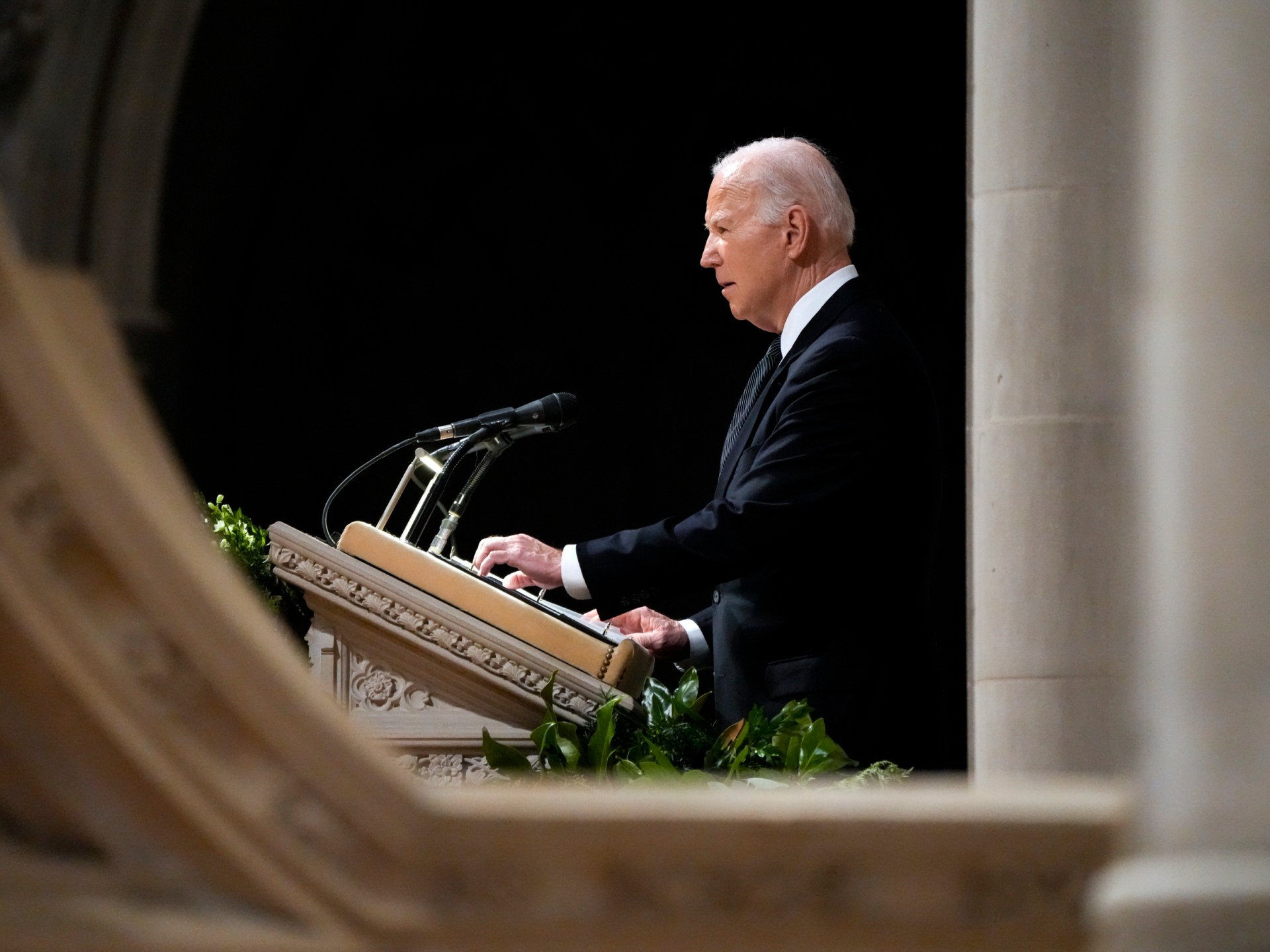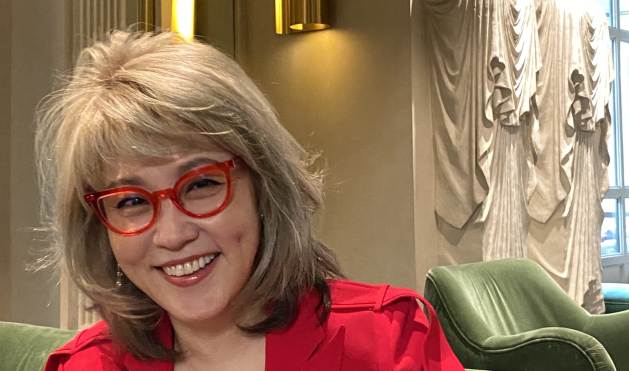Thorny question of presidential ‘age limit’ grows in US political discourse | Joe Biden News
The question of whether there should be an age limit for US presidents was raised in a particularly high-profile public forum this week when Congresswoman Katie Porter said in a televised debate that such restrictions “are a conversation for all elected officials that we ought to be having”.
Porter’s acknowledgement was made during a candidate debate for the US Senate seat left vacant by Dianne Feinstein’s death in September and represents the latest instance of a thorny issue that is increasingly becoming a topic of discussion in mainstream political life, as the inevitable rematch between 81-year-old Joe Biden and 77-year-old former President Donald Trump takes shape.
If elected, Biden would become the oldest sitting president in US history, a mantle he first claimed when he took office in 2021, while Trump would tie Biden for the record if he were to enter office next January at the age of 78.
It is an unprecedented situation that has brought potentially uncomfortable questions of age to the fore on cable and internet news talk shows, academia, and public opinion polls. Discussions of cognitive decline in the elderly have proven particularly fraught, raising the spectre of ageism and ableism and a delicate question: How old is too old to lead the wealthiest and most powerful nation in the world?
“This year, there’s been an exceptional focus on the age of the candidates, particularly the age of President Biden,” Steven Austad, a professor focusing on ageing at the University of Alabama in Birmingham, said on Thursday while moderating a webinar on presidents and age.
“It is an issue that’s not simply being raised by his political opponents, but it’s also been whispered about among people in his own party.”
As Porter – a left-leaning Democrat who has aligned with Biden in the past – showed on Monday, those whispers can sometimes be deafening. As the election season draws near, lawmakers, particularly Democrats, have been forced to confront the issue of age more directly, according to Nicholas Beauchamp, a professor at Boston’s Northeastern University who studies political discourse.
“Whereas before they sort of avoided it in various ways,” he said.
Beyond concerns that advanced age could undermine an official’s ability to perform in demanding jobs, critics have also called it a feature of party politics that favour loyal incumbents and seeks to shut out potentially disruptive upstarts who are more representative of the country’s youth.
Porter’s comments “speak to the cleavage within the Democratic Party between the younger members and the older members”, according to Beauchamp, who noted that the 50-year-old congresswoman is competing for the same demographic as 77-year-old progressive stalwart Barbara Lee in the race for the open California seat.
“So she’s kind of in the strategic position where she needs to emphasise her youth and empathise with younger Democrats, who may be more concerned about Biden’s age,” he said.
Uncomfortable question
Recent times have seen public discourse over the subject grow to a fever pitch; elected officials are staying in office longer as life expectancies have extended.
Infirmities and illnesses affecting Congressional leaders in recent years – including Feinstein, who died in office at the age of 90, 81-year-old Mitch McConnell and 90-year-old Chuck Grassley – have increasingly stoked calls to impose age or term limits for members of the Senate and House of Representatives.
Supporters have argued such limits would discourage parties from continuing to prop up elderly incumbent candidates who are seen as electoral safe bets.
But Porter’s articulation of the need to at least explore age limits elevates the argument of those who say term limits are not enough. To be sure, Porter, who was responding to a question on presidential age limits during the debate, said she was not using age as a metric to measure Biden.
US presidents are already constitutionally constrained by two four-year terms. There is a minimum age requirement of 35 years, but no maximum age limit. Adding one would require a constitutional amendment, which in itself would require massive – and near-impossible – bipartisan support in both chambers of Congress.
It would also require lawmakers to answer a question that many bioethicists and ageing experts see as impossible: What would the cut-off age be?
Speaking at Thursday’s webinar, Dr Bradley Willcox, a geriatrician, pointed to the difference between “chronological age” and “biological age”. Put simply, people age differently and maintain vastly different levels of functionality, despite some broad trends.
He said it is not feasible to determine an age limit without it being arbitrary.
“It totally abrogates the relationship [between biological age and chronological age], because you can be 20, 25 years younger biologically,” he said. “So are you going to make it a calendar age or your biological age that is the limit?”
He also pointed to problem-solving capacities like inductive reasoning – the ability to draw larger conclusions based off of specific evidence – and crystallised intelligence – the ability to make decisions based on accumulated knowledge – which are shown to increase with age. Meanwhile, memory and the capacity to learn new problem-solving approaches tend to diminish.
Jay Olshansky, a professor of epidemiology and biostatistics at the University of Illinois, Chicago, also described the folly of attempting to use other physical and medical measures to determine a president’s fitness to serve based on their age.
“I’m waiting for the cartoon to come out with two presidential candidates on treadmills – connected to every conceivable device,” he said. “This is what running for president will be, a measure of just cognitive functioning and physical functioning and no longer about all the issues that everyone’s interested in.”
Still, the question of presidential age – and age limits – is unlikely to leave the political discourse any time soon.
That is consistent with public opinion polls that have shown widespread support for imposing age limits. In October of last year, 82 percent of Republicans and 76 percent of Democrats supported imposing a maximum age limit for federal elected officials, according to a survey by Pew Research Center. A CBS News/YouGov poll a month earlier found three-quarters of Americans support such a limit.
Last year, Republican Representative John James introduced a constitutional amendment to bar anyone over 75 from becoming president, despite James’s support for the 77-year-old Trump. The largely symbolic bill had zero co-sponsors.
In North Dakota, an initiative seeking to effectively set an age limit at 80 for congressional candidates appears to have garnered enough signatures this month to get on the ballot during the state’s primary election in June, according to The Associated Press.
The effort would likely be subject to a constitutional challenge.
‘Inidicator rather than cause’
Recent developments continue to fuel the debate, which has pitted partisans highlighting the issue as a political cudgel against opponents voicing “legitimate dissatisfaction” with ageing politicians, explained Northeastern’s Beauchamp.
Neither Biden nor Trump has been able to put to rest concerns over their advanced ages. Notably, Biden and his surrogates have been forced to address a report by Special Counsel Robert Hur, which painted the president’s memory as “severely limited”, including not remembering the date of his son’s death. During an interview, Biden presented himself as “a sympathetic, well-meaning, elderly man with a poor memory”, according to Hur.
In a fiery rebuke, Biden took to the presidential podium to condemn the insinuations: “How dare he?” he said, as he defended his mental acumen. Still, a gaffe later in the speech, in which he referred to Mexico in place of Egypt, may have weakened his rebuke of Hur.
Broadly, Biden and his allies have sought to frame his age as an asset and representative of his experience.
Similarly, Trump’s top Republican competitor, Nikki Haley, has ridiculed the former president for several recent miscues, including a speech in which he repeatedly confused former House speaker Nancy Pelosi with Haley.
Still, Beauchamp argued the current political discourse is perhaps best viewed as a symptom “of deeper questions” surrounding the US political system and norms that widely favour incumbents.
“In Congress, the answer to the question [of incumbency] … is money or gerrymandering or some combination of those two,” he said. “And that’s relatively straightforward”.
“But for party leadership and the president … there’s still sort of this deeper question of the entrenchment of power,” he said. “Why has the leadership of the Democratic Party not had any turnover since the 1990s?”
“The age stuff is just an indicator rather than the actual cause.”
Check out our Latest News and Follow us at Facebook
Original Source







